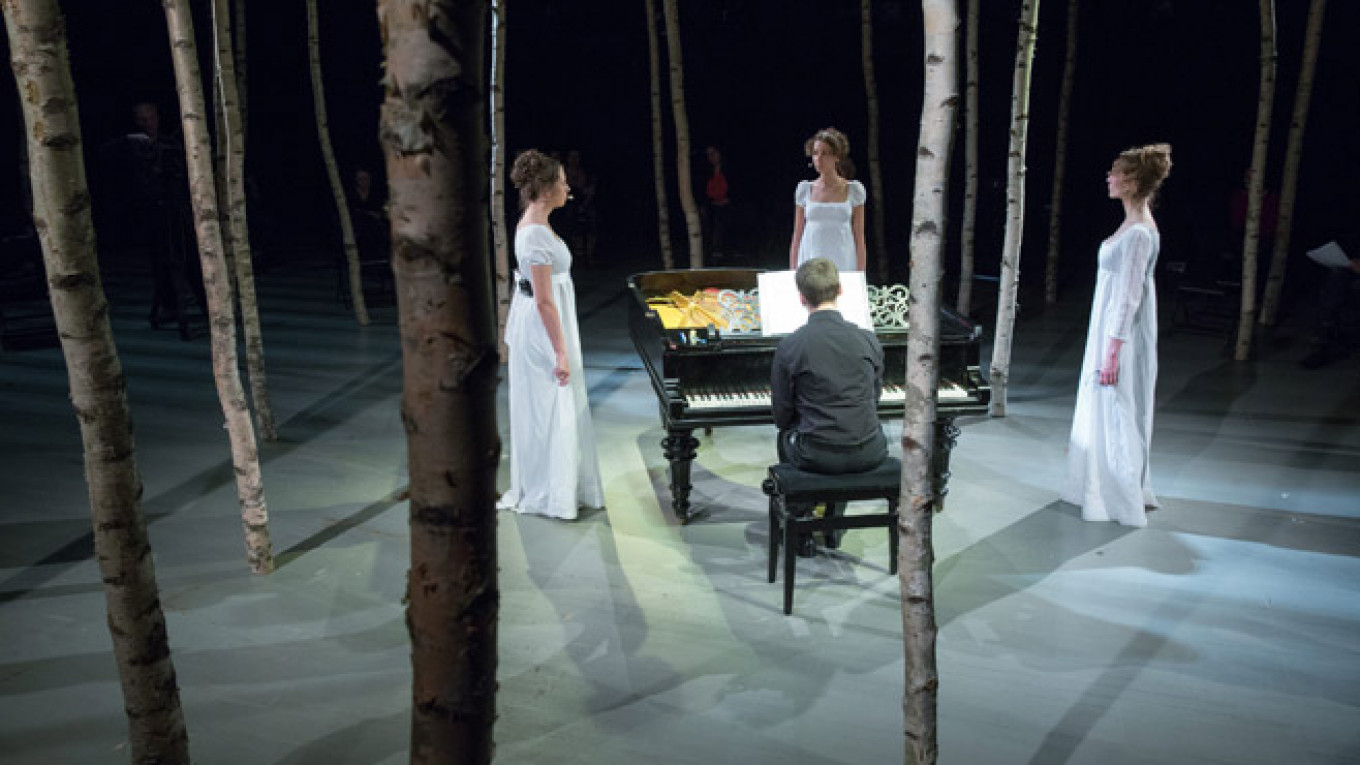The romance — or romantic ballad, if you will — is one of the cornerstones of Russian culture. Imagine Russian cinema or classical drama without the romance. Imagine an all-night party in someone's cramped kitchen or living room. Sooner or later in any one of these settings you will hear a romance or three.
It may break your heart, or it may prime your heart for love. It depends on the circumstance and your frame of mind.
Romances are great mood-setters in an artistic context. Performed on the concert stage, they can move an entire hall to sighs and tears. But what about building an entire theatrical performance around them?
I'll admit, when I first heard that Dmitry Volkostrelov was planning a production called "Russian Romance" at the Theater of Nations, it had me scratching my head. How do you do that?
But this is a perfect example of why, instead of jumping to conclusions, you wait and see what the artist has in store. Now having seen Volkostrelov's unorthodox, tenderly sensitive creation, I can't possibly imagine it being anything other than what it is.
Designer Ksenia Peretrukhina placed the action in the ideal Russian setting — in the midst of a birch forest. Dozens of real birch trunks hang suspended from the flies throughout the space of the small hall at the Theater of Nations. As if punning on one of the oldest cliches about hackneyed theatrical tricks — "then a piano began to play in the bushes" — Peretrukhina plopped a baby grand right in the middle of the forest. She also scattered 100 spectators on lone-standing chairs in and among the tree trunks.
Key to this performance is the director's studiously slow tempo. Transitions are slow, actors move and speak slowly. Gestures are deliberate. At one point two actresses slowly turn and look at each other for the first time and it is a major event.
Volkostrelov is determined to coax us back into a frame of mind that might approximate the temperament of the 18th or 19th centuries, when the Russian romance flourished. This was a time when one might sit by a window and spend the better part of the day reading a novel, glancing out at a snowy vista and thinking languorously about life, love, loss and desire.
Three actresses begin by standing motionlessly at microphones and simply speaking lines from beloved old romances in a way that seems to be random.
"I have outlived my desire," whispers one. "I remember that hour of fiery debate," intones another.
Lacking the music and coherence of a full-fledged song, the unadorned, amputated lines strike us directly. The soft voices speaking them leave us contemplating the realities of love's erosion and decay.
After sharing a wealth of lyrics stripped of song, each actress, as well as an unseen fourth, shares with us her thoughts on romances, her feelings about the show they are creating, and even tales of family and friends.
The one absent, disembodied voice ruminates on the nature of her collaboration. "You are at a show where I am not," she says. "That is, I am, but I am not."
It is as intriguingly slippery as the transient love most romances eulogize.
This all holds off that moment when we encounter the romances themselves, giving us an enriched background that helps us hear them in a context broader than "boy meets girl, boy loses girl." Even when a pianist finally takes the stage, he does not launch into the concert everyone expects. Pulling back the top of the baby grand, he leisurely plinks and plunks at the strings.
For the half-dozen or so performed romances, the actresses, now wearing white, 19th-century gowns, circle the piano. Each takes two turns at singing, while the pianist often stops the action by reshuffling his notes or going again into the bowels of his instrument to pick at the strings.
I was shocked to see relatively large numbers of spectators begin tiptoeing out of the hall after the midway point. Maybe they came with a hard-set notion of what they wanted to see.
I was enthralled. Volkostrelov and his company created a beautiful, touching, resonant piece of performance art that reshapes, refreshes and renews our understanding of, and connection to, the Russian romance.
"Russian Romance" (Russky Romans) plays Sat., Sun., March 30 and 31 at 8 p.m. On the small stage of the Theater of Nations, located at 3 Petrovsky Pereulok. Metro Chekhovskaya. Tel. 495-629-3739. Running time: 1 hour, 30 minutes.
Contact the author at artsreporter@imedia.ru
A Message from The Moscow Times:
Dear readers,
We are facing unprecedented challenges. Russia's Prosecutor General's Office has designated The Moscow Times as an "undesirable" organization, criminalizing our work and putting our staff at risk of prosecution. This follows our earlier unjust labeling as a "foreign agent."
These actions are direct attempts to silence independent journalism in Russia. The authorities claim our work "discredits the decisions of the Russian leadership." We see things differently: we strive to provide accurate, unbiased reporting on Russia.
We, the journalists of The Moscow Times, refuse to be silenced. But to continue our work, we need your help.
Your support, no matter how small, makes a world of difference. If you can, please support us monthly starting from just $2. It's quick to set up, and every contribution makes a significant impact.
By supporting The Moscow Times, you're defending open, independent journalism in the face of repression. Thank you for standing with us.
Remind me later.







